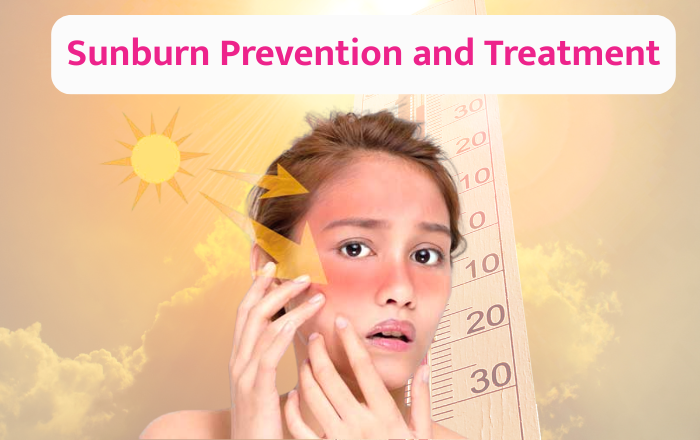As the summer sun blazes overhead, spending time outdoors becomes a part of our daily routine—be it vacations, pool time, or just running errands. However, prolonged exposure to the sun can lead to sunburn, a painful and damaging skin condition. Fortunately, with the right precautions and timely treatment, sunburn can be both prevented and managed effectively. According to Dr. Priyanka Tambe at Dermadent Clinic, understanding your skin and taking preventive steps is key to avoiding long-term damage. If you’re dealing with sun-related skin concerns or severe sunburns, it’s always best to consult a qualified dermatologist in Dhankawadi for expert care and personalized advice.
What is Sunburn?
Sunburn occurs when the skin is overexposed to the sun’s ultraviolet (UV) rays, especially UVB rays. This causes damage to the skin’s outermost layers, resulting in redness, pain, swelling, and sometimes peeling or blistering. While mild sunburn may resolve in a few days, repeated sun damage can lead to premature aging, pigmentation issues, and even increase the risk of skin cancer.
Signs and Symptoms of Sunburn
-
Red, inflamed skin
-
Pain or tenderness
-
Skin that feels hot to the touch
-
Swelling in the affected area
-
Peeling of the skin after a few days
-
Blistering in severe cases
-
Headache, fever, or fatigue (in extreme sunburns)
Who is at Risk?
Anyone can get sunburn, but individuals with fair skin, light-colored eyes, and a history of sunburn are more prone. Children, outdoor workers, and those on photosensitive medications should be particularly cautious during summer.
Prevention: Shielding Your Skin from Sunburn
Preventing sunburn is not only easier than treating it but also essential for long-term skin health. Here are simple yet effective tips to protect your skin this summer:
1. Use Sunscreen Regularly
-
Apply a broad-spectrum sunscreen with SPF 30 or higher at least 20 minutes before stepping out.
-
Reapply every two hours, or more frequently if swimming or sweating.
-
Don’t forget to cover often-missed spots like ears, neck, feet, and the back of your hands.
2. Wear Protective Clothing
-
Opt for long-sleeved, lightweight, and breathable fabrics.
-
Wide-brimmed hats and UV-protective sunglasses are great additions to your sun-defense wardrobe.
3. Avoid Peak Sun Hours
-
The sun’s rays are strongest between 10 a.m. and 4 p.m.
-
Try to schedule outdoor activities during early mornings or late afternoons.
4. Seek Shade
-
Whether it’s under an umbrella, a tree, or a canopy, staying in the shade reduces direct sun exposure significantly.
5. Stay Hydrated
-
Dehydration can worsen the effects of sunburn. Drink plenty of water throughout the day, especially when spending time outdoors.
Treatment: What to Do If You Get Sunburned
Despite your best efforts, if sunburn does occur, prompt care can minimize discomfort and promote healing.
1. Cool Down the Skin
-
Take cool (not cold) showers or baths to soothe the skin.
-
Apply a cold compress or a damp cloth to the affected area for 15–20 minutes.
2. Moisturize
-
Use fragrance-free moisturizers or aloe vera gel to calm irritated skin.
-
Avoid petroleum-based products as they can trap heat in the skin.
3. Stay Hydrated
-
Drink plenty of fluids to help your skin recover and prevent dehydration.
4. Over-the-Counter Relief
-
Nonsteroidal anti-inflammatory drugs (NSAIDs) like ibuprofen can reduce pain and inflammation.
-
Calamine lotion or hydrocortisone cream can ease itching and swelling.
5. Avoid Further Sun Exposure
-
Until the sunburn heals, keep the affected area covered and stay out of direct sunlight.
6. Do Not Peel or Pop Blisters
-
Let your skin heal naturally. Picking at peeling skin or popping blisters can lead to infections and scarring.
When to See a Dermatologist
Most sunburns heal on their own, but if you experience severe symptoms like:
-
Blisters covering a large area
-
Fever, chills, or nausea
-
Signs of infection (pus, increased redness)
-
Persistent pain or discomfort
…it’s time to consult a skin specialist. A qualified dermatologist in Dhankawadi can provide advanced treatment options and assess the extent of skin damage.
Long-Term Care and Skin Health
Recovering from sunburn doesn’t mean you’re safe from future damage. Make sun protection a daily habit, even on cloudy days or when indoors near windows. Regular skin checks are also important to catch any early signs of sun damage, pigmentation, or abnormal growths.
At Dermadent Clinic, Dr. Priyanka Tambe provides comprehensive care tailored to your skin’s needs. Whether it’s treating sunburn, managing pigmentation, or offering the latest dermatological treatments, expert care is just an appointment away. Protect today to prevent tomorrow’s damage—and let your skin glow healthily all summer long under professional guidance.


